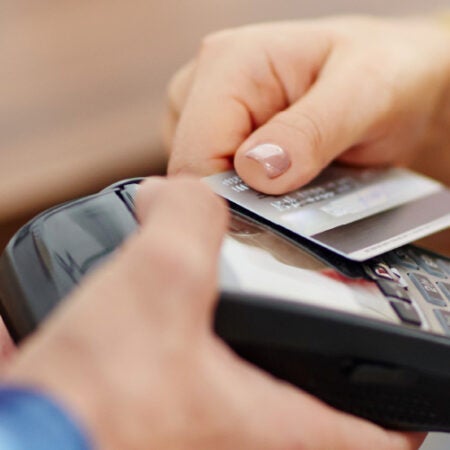
When you can’t pay or forget to pay a credit card bill, it may feel like the end of the world, or at least the end of your good credit score. But depending on what actions you take next, it doesn’t have to be quite that bad.
Here’s what happens when you don’t pay your credit card bill, what’s at stake and how you can avoid the worst of the potential consequences.
You Accrue Late Fees and Interest
Any time you miss a payment—meaning, you don’t pay even the minimum balance due—the first two things you may have to deal with are late fees and increased interest rates.
Late Fees
As of 2020, credit card companies can charge a late fee of up to $29 for the first late payment, and up to $40 for any additional late payments within six months of each other. (These numbers are adjusted yearly based on inflation.) The fee can also not exceed the amount of the minimum balance due, so if you missed a payment with a $15 minimum, your late fee can’t be more than $15.
Many companies will actually often waive late fees. Adam Marlowe, principal experience officer for Georgia’s Own Credit Union, says, “Late fees are meant as a form of punishment because you didn’t fulfill your contractual obligations. Given that, most companies will forgive that as long as it’s not habitual.” You may need to reach out to your credit card provider and specifically ask them about waiving your fee, however.

Interest
When your payments become 60 days past due, a creditor can typically increase your interest rate, though they must give you 45 days’ notice before doing so. They may increase it to the maximum rate possible for your card, which is known as the penalty rate and is usually around 29.99%.
With an interest rate this high, you can see how the longer you go without making your credit card payments, the harder it becomes to catch up on your payments and late fees. If your rate is increased, focus on paying your credit card bill on time for six consecutive months, at which point your rate should be lowered.
Your Bill Is Sent to Collections
If you stop making payments for several months, your account will be sent to collections. At this point, according to Beverly Harzog, consumer credit expert and author of The Debt Escape Plan, your credit card company “will no longer negotiate with you because they no longer own the account. You’ll have to deal with the collector.” The collector and potentially even the IRS will reach out to you to secure payment for your debt.

Collection accounts can stay on your credit report for seven years, even once you’ve paid them off, and they can have a big impact. This is just one of many ways your credit can be affected when you miss credit card payments.
Your Credit Score Drops
Because credit payment history makes up 35% of a FICO® score, not paying your credit card bill can have long-term consequences. You have a window of 30 days to make a late payment—as soon as it is more than 30 days late, it is added to your credit report. How much this affects your score depends on the other items in your report, but generally speaking, the higher your score is, the more points you can lose.
Having a late payment (or several) on your report isn’t a good thing, but over time, the impact of such an item will decrease, and future on-time payments may be able to help reduce the damage to your score. Once seven years from the delinquency date have passed, the late payments should drop off.
What Doesn’t Happen When You Stop Paying Your Credit Card
You may know what does happen if you stop paying your credit card, but many people are less familiar with what does not happen when payments are stopped.
You Won’t Go to Jail
First, you will not go to jail for not making your credit card payments. However, in some states, if you ignore a court order to attend a hearing or make a payment, there may be consequences that include jail time. To be safe, always comply with notices from the court.
Credit Card Debt Won’t Be Forgiven
Second, short of you declaring bankruptcy, your credit card debt will not be forgiven, or completely eliminated. There are a few different options for managing, reducing or consolidating this kind of debt, and each comes with its own pros and cons.
If you’re looking for some level of debt relief, you will need to talk to either your credit card issuer or your debt collector, depending on what stage of the process you’re in. Negotiating a repayment plan might be a more realistic goal than getting any part of your debt forgiven.
How to Pay Down Credit Card Debt
Though it will take work, paying off your credit card debt doesn’t have to be too complicated. Contact your lender, pay the past-due balance when you can and pay your cards off in order of priority.
Contact Your Lender
The moment that you get behind on your payments and you know it’s not just a one-time thing, you should get in touch with your lender. This is because the sooner you can formulate a game plan for your credit card bills, the better off your financial health will be. Ask your credit card company about their terms regarding late fees, interest rate increases and repayment plans.
Pay the Past-Due Balance as Soon as Possible
It’s important that you pay your past-due balances as soon as you can, or at least make the minimum payments. This will help you avoid accruing more late fees and interest on top of the money you already owe.
Even if it has already been over 30 days since your payment was due, you can still aid your credit score by keeping additional late payments off of your report. Plus, you want your account to stay far away from collections.
Prioritize Which Cards to Pay Off First
When money is tight, you may have to make tough decisions about which cards should be paid first. If possible, pay the minimum on every card no matter what to avoid late fees and impacts on your credit. Once you’ve done that, you’ll need to determine which cards take precedence for additional payments.
You can approach your credit card payments in one of two ways:
- The avalanche method. With this approach, you pay the card with the highest interest rate first, which will ultimately save you money. However, taking this approach can be disheartening if this card also has the highest balance, because it will take longer to be paid off in full.
- The snowball method. When you use this method, you pay the card with the lowest balance first. This will save you less money in the long run but will help you feel like you’re making progress faster.
Take a look at your finances and decide what is more important to you—saving money on interest payments or maintaining your motivation to pay off your debt. Once you’ve identified which method you want to use, list your cards according to your new system. Every month after making your minimum payments, dedicate your extra money to the card at the top of your list until you have caught up on your debts.
Credit Card Debt and Coronavirus Resources
In August 2019, The New York Times reported that a number of credit card companies were beginning to offer flexible payment plans because “the options make it easier for their customers to borrow money, and to manage their monthly cash flow.” Some financial planners believe that so long as they’re used responsibly, these options can be good for consumers who need them.
Before the coronavirus (COVID-19) pandemic, flexible payment plans might have seemed more unique; now, as many Americans worry about paying even their most basic expenses, it seems inevitable that many banks and creditors would be showing more leniency in regard to credit card bills. If you’re struggling financially at this time, call your lender to find out if you can possibly skip payments, get lower interest rates or avoid late fees.
Whatever the reason, if you don’t make your credit card payments, there will usually be some consequences. These should not be permanent, and you can still take steps to protect your credit score as much as possible going forward. When you’re ready to learn more about your credit, contact CreditRepair.com.





